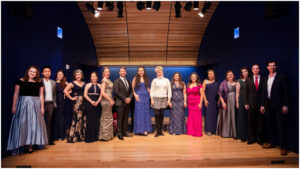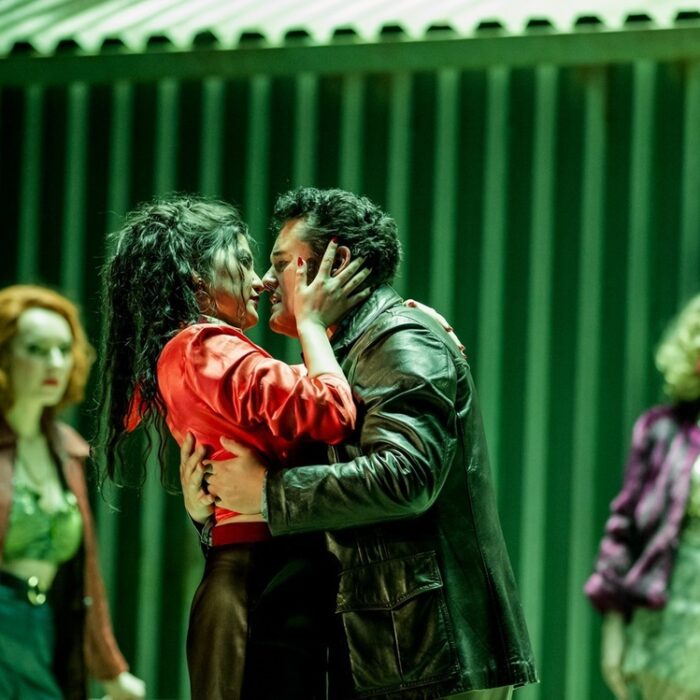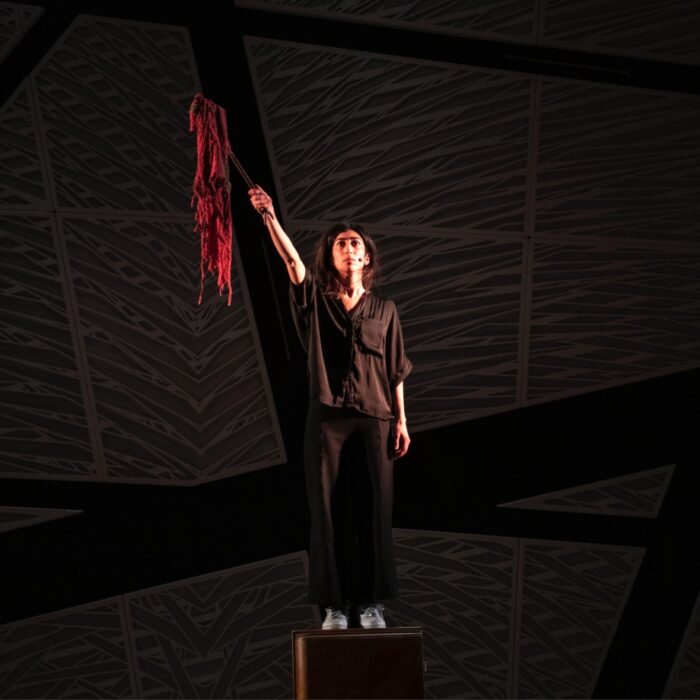
Talents of the World 2019 Review: International Voice Competition Grand Finals
By Logan MartellOn December 5, 2019, Talents of the World held the grand finals for their third International Voice Competition. Sixteen finalists from across the competition’s regions came together before a panel of judges, comprised of Talents of the World’s directors as well as prominent artistic managers.
The opening remarks were delivered by company artistic director Olga Lisovskaya, dedicating this competition to the memory of Dominican tenor Francisco Casanova, who passed away in September; a supporter of emerging artists, Casanova served on the judges’ panel for previous years of the competition.
In Come the Finalists
First of the finalists was soprano Susanne Burgess. Her first number, “Furie Terribili” from Handel’s “Rinaldo,” showcased great vocal flexibility, able to draw upon a wealth of tones across her wide dynamic range. Her second number, “Chi il bel sogno” from Puccini’s “La Rondine,” allowed her to float through a gentler musical texture, full of sonorous legato.
Next was baritone Johnathan McCullough, singing “Hai gia vinta la causa” from Mozart’s “La Nozze di Figaro.” His strong physical and vocal presence was bolstered by his crisp Italian diction. Animated without being overly comical, McCullough’s rendition was fun to watch. His second number was Hamlet’s aria from Ambroise Thomas’ opera, “Hamlet.” McCullough’s firm vocal leaps carried through the driving opening section, displaying a masculine vibrato which lasted even through the more vulnerable sentiments of the following section.
Following him was soprano Lauren McQuistin, with an abridged rendition of the letter scene from Tchaikovsky’s “Eugene Onegin.” Plunging right into the drama, McQuistin quickly generated an authentic, burning passion. Her second number, “In Quelle Trine Morbide” from Puccini’s “Manon Lescaut,” made for a more measured look into her lovely, classical soprano.
The next finalist was soprano Sarah Rymen, singing “Sola, perduta, abbandonata” from Puccini’s “Manon Lescaut.” The somber chords of the accompaniment were matched by a fittingly distant expression from Ryman, whose lyricism displayed a beautiful, grieving sentiment.
After Ryman was mezzo-soprano Sophie Michaux, whose first number was “Fra il Padre e fra l’amante” from Rossini’s “La Donna del lago.” Her bright vocality and demeanor made itself clear as Michaux launched into the ornamented lines with fun energy. These strong and joyful tones carried through her plunges into her lower register, able to rise back up to a powerful height. Her second number, “Give him this orchid” from Britten’s “The Rape of Lucretia,” made for a stunning contrast thanks to the dire musical atmosphere and Michaux’s grave interpretation.
Next was soprano Maria Khoobyar, with her first song “Il tuo sangue o il mio amore” from Puccini’s “Tosca.” Her account of murdering Scarpia was carried by her frantic energy, her interpretation accented by the vocal grit which often burst into sonority with great emotion. Her second number, “Song to the moon” from Dvorak’s “Rusalka,” let her display a softer dynamic, with her relishing lower phrases able to build with much power.
Following this was bass SeungHee Lee, singing “Quand la flame de l’amour” from Bizet’s “La joile fillie de Perth.” His rich voice did not lack for support as Lee staggered with the rhythm to convey Ralph’s drunkenness. His rejected phrases flowed into bittersweet vocalizing, with Lee demonstrating a captivating, maudlin power. His second number was “Vi ravviso, o luoghi ameni” from Bellini’s “La sonnambula.” Nicely handling the ornaments of his tender, outlining phrases, Lee’s repetition of “non trovo piu,” carried an abyssal vocal beauty.
Next was soprano Maria Maksakova, with her first number “Ben io t’invenni” from Verdi’s “Nabucco.” Maksakova displayed great vocal control; while the smaller venue led to instances of artists using a power suited for larger spaces, Maksakova’s vocal strength remained pleasing throughout. Her dramatic sense was seen as her relishing expression broke into a more somber bearing, leading to a haunting diminuendo as Maksakova brought the number to a lovely, pious close. Her second number “Dich teure Halle” from Wagner’s “Tannhauser,” saw her employ a caressing German diction, which swelled with her powerful, rising lines.
Part 2
The second half of the competition was opened by soprano Sooyeon Kang, singing “Quel guard il cavaliere” from Donizetti’s “Don Pasquale.” Her reading of the knight in love was broken by her delightfully haughty laughter, with the livelier middle section drawn out with enticing repetitions of “Conosco” as she listed off her seductive powers. Her second number, “Adieu, notre petite table” from Massenet’s “Manon,” featuring softer, vulnerable tones as Kang sadly navigated the phrases of departure.
Following this was baritone Brian Murray, with “E fra quest’ anise” from Leoncavallo’s “Pagliacci.” His voice displayed an immediate richness that soon peaked for passionate repetitions of “Nedda!” This affectionate vocal firmness carried the aria with a highly endearing charm. His second number was “Dieux qui me poursuivez” from Gluck’s “Iphigenie en Tauride.” This dramatic aria saw Murray employ great strength along with tones ranging from frantic to triumphant, along with a clear command of the French text.
Next was soprano Alina Tamborini, singing “Adele’s Audition Aria” from Johann Strauss’ “Die Fledermaus.” Her effervescent voice worked well with the bouncing rhythm. The ornamented lines were nicely shaped by Tamborini’s energetic warmth, and she remained in control of her breath and support through the ornaments which come between her phrases with little break. Her second number, “Ach, ich liebte” from Mozart’s “Die Entfuhrung aus dem Serail,” saw her more dramatically focused, employing a firm vocality throughout.
Following was soprano Nina Mutalif, also singing a portion of the letter scene from Tchaikovsky’s “Eugene Onegin.” Her youthful tones carried excitement as well as apprehension, with Mutalif able to build to passionate emotional heights. Her second number was “Come Scoglio” from Mozart’s “Cosi Fan Tutte,” which saw Mutalif display her lyrical strengths as well as ornamentation in later passages.
Mezzo-soprano Maggie Renee Valdman came next, singing Olga’s aria from “Eugene Onegin.” Her bubbly opening soon tapered to a slower, lovely sentiment which retained its brightness even as Valdman dipped into her lower register. Her second number, “Must the Winter Come So Soon” from Barber’s “Vanessa,” made for a reflective contrast. Valdman’s questioning tones made her phrases sadly ache through this slower aria.
After this was soprano Dilara Unsal, singing “Anch’io dischiuso un giorno” from Verdi’s “Nabucco.” With the opening showing her full quality of voice, Unsal beautifully diminished to lead to the following section’s fiery passion. Her second number, “Vissi D’arte” from “Tosca,” displayed a beautiful, despairing sentiment through the rising phrases before she powerfully struck the climactic high C, bringing the aria back down to its crushed ending.
Next of the finalists was soprano Sulgi Cho, with “Ah, douce enfant” from Massenet’s “Cendrillon.” Her opening ornaments were handled gracefully, with the brief phrases bursting into quick leaps or colors, which Cho made great use of along with her charming expression and delivery. Her second number, “Ah, non credea mirarti,” from “La Sonnambula,” featured beautiful legato phrases from Cho, building towards rapid ornaments and a powerful conclusion.
Finally was bass Tyler Putnam, singing “Old Man River” from Kern’s “Show Boat.” The bitter tones of his verse emphasized the struggle of life, as well as the escape the river represents as Putnam drew the phrases out with control and nuance. His second number was “La Calunnia” from Rossini’s “Il Barbiere di Siviglia.” This aria made for a highly fun contrast as Putnam adopted a devilish grin to match his dark, energetic tones. His forte repetitions and rapid passages were deftly handled with Putnam build to a massive conclusion.
After much deliberation, the judges panel came to a decision and named their winners. The encouragement award for promising talent went to Maggie Renee Valdman. In fourth place was a tie between Nina Mutalif and Johnathan McCullough, with third place going to Alina Tamborini, second place to Sooyeon Kang, and first prize going to Bryan Murray.
In addition to their cash prizes, the winners will also appear with Talents of the World in their upcoming Christmas Festival at Carnegie Hall, where they will no doubt delight audiences with their artistry.



